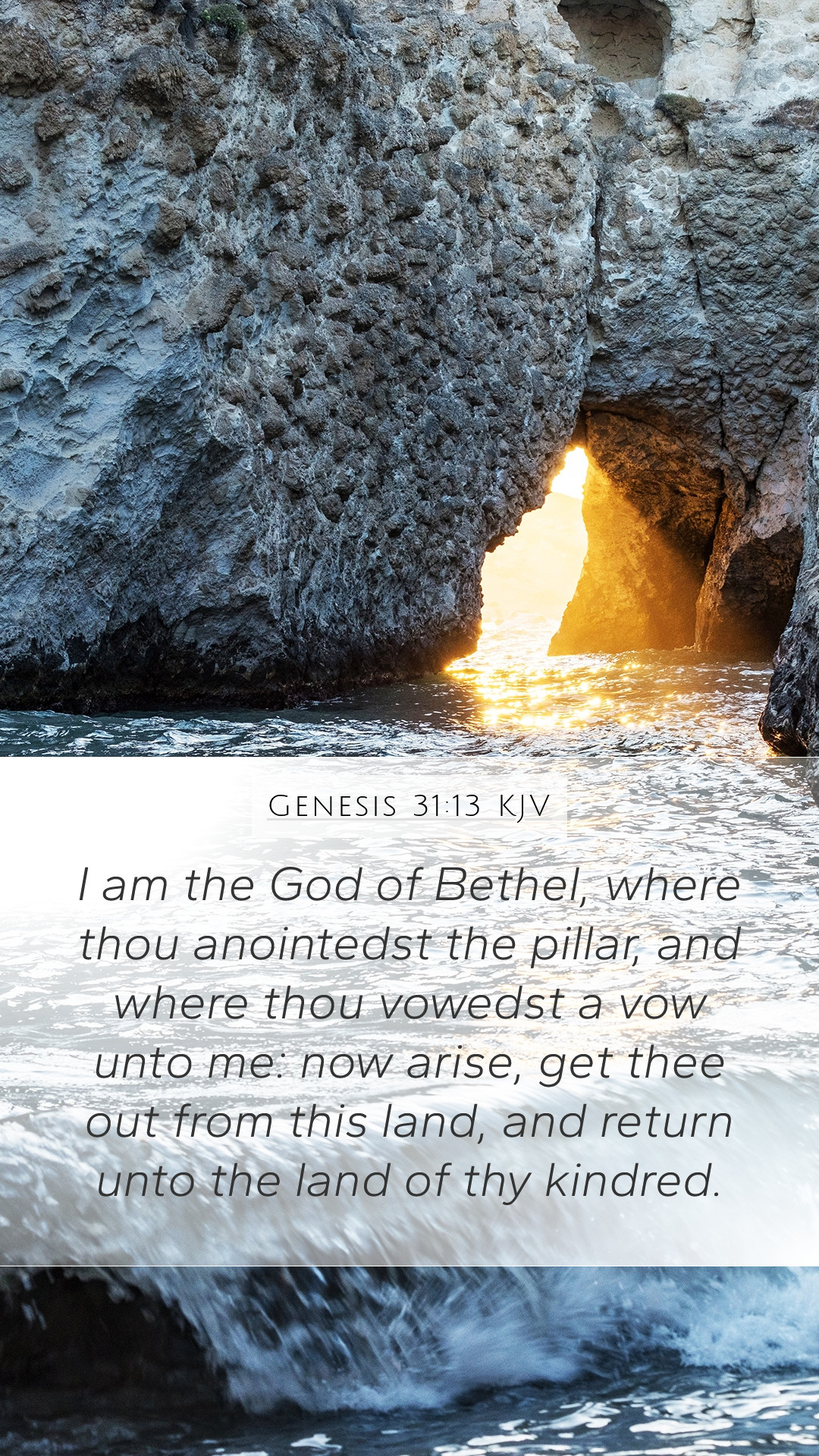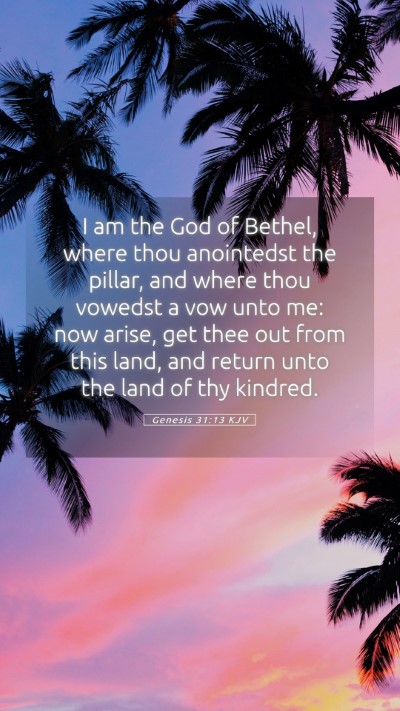Understanding Genesis 31:13 - Bible Verse Meaning and Commentary
Genesis 31:13 states: "I am the God of Bethel, where you anointed a pillar, and where you made a vow to Me. Now arise, get out of this land, and return to the land of your family."
This verse is rich in theological and historical significance, as it reveals key themes of God’s relationship with Jacob, affirming commitment, divine guidance, and reflective on promises made by patriarchs.
Summary of Insights from Public Domain Commentaries
-
Matthew Henry's Commentary
Matthew Henry emphasizes the crucial aspect of Jacob’s divine calling. When God identifies Himself as "the God of Bethel," it serves as a reminder of the sacred encounter Jacob had previously, recognizing Bethel as a place of worship and significant revelation (Genesis 28:10-22). Henry points out that Jacob’s vow at Bethel marked a transforming moment of faith and commitment to God, highlighting the importance of sacred spaces in our spiritual journey.
-
Albert Barnes' Notes
Albert Barnes highlights that God's command to Jacob to return emphasizes obedience to divine direction. Barnes elucidates the notion that God seeks to lead His followers back to their roots and reaffirm their faith commitments through remembrance of past encounters with Him. This divine directive suggests that while Jacob prospered in a foreign land, true fulfillment lies in returning to where God's blessings originated.
-
Adam Clarke's Commentary
Adam Clarke explores the historical context of this scripture by underscoring Jacob's earlier encounter with God. Clarke explains how the setting of Bethel is not only of geographical significance but also of profound spiritual importance. By recounting this memory, God urges Jacob to reflect on his past promises and follow the divine instructions for his future path. Clarke's exposition notes God’s grace in guiding Jacob away from Laban's influence back to his familial roots.
Thematic Analysis
The theme of divine revelation blends seamlessly into the call for obedience present in Genesis 31:13. This verse marks a pivotal moment illustrating God's determination to guide His chosen individuals towards their destinies. In this case, Jacob is called back to fulfill his initial vow made in Bethel.
God’s Assurance
By titling Himself, “the God of Bethel,” God reassures Jacob of His consistent presence and faithfulness, establishing the connection between Jacob’s past and future. Thus, the meaning of the Bible verse resonates deeply within the themes of reassurance and redirection, foundational in understanding Scripture’s design.
Obedience as a Reflection of Faith
The emphasis on obedience stands as a critical lesson for Bible study groups and individuals engaging in online Bible study. Jacob's response to God is central to the Biblical narrative—an encouragement to align personal actions with divine will, fostering deeper Bible verse understanding.
Cross References
Genesis 31:13 connects with several other Bible verses that enrich its interpretation:
- Genesis 28:10-22 - Jacob’s initial dream and vow at Bethel.
- Genesis 32:1-2 - God’s protection reaffirmed as Jacob prepares to meet Esau.
- Exodus 3:6 - God identifies Himself with the promises made to Abraham, Isaac, and Jacob.
- Joshua 24:2-3 - A reminder of God’s actions in the lives of the patriarchs.
- Hebrews 11:8-9 - The faith of Abraham and his descendants highlighted.
Applications for Daily Life
The message in Genesis 31:13 encourages Christians today to reflect on their personal journeys of faith and the vows made to God. In applying Bible verse interpretations to daily life, individuals are prompted to:
- Revisit and honor the spiritual commitments made in moments of profound revelation.
- Seek God’s guidance in all decisions and life transitions.
- Recognize the significance of returning both physically and spiritually to places of early faith experiences.
Conclusion
Genesis 31:13 encapsulates a critical juncture in the life of Jacob, thus underscoring the profound meaning of Bible verses through divine encounters. As believers delve into Bible study resources, this verse serves as a reminder of God’s faithfulness and the call to live in obedience to Him, whether through personal exploration in Bible study lessons or engaging discussively in Bible study groups.


